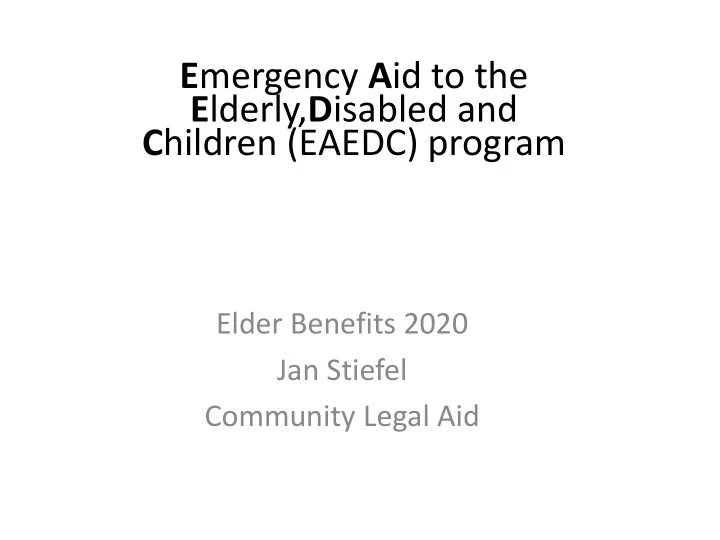

E mergency A id to the E lderly, D isabled and C hildren (EAEDC) program Elder Benefits 2020 Jan Stiefel Community Legal Aid
EAEDC • State-funded cash assistance program (“general assistance”) • Provides a small cash grant and MassHealth to specific categories of low-income people • Legally present immigrants not SSI eligible may qualify for EAEDC (& with it MassHealth) 106 C.M.R. §§ 703.440 - 703.460
EAEDC • EAEDC has different "living arrangements" that set the maximum EAEDC benefit for each situation. 106 C.M.R. § 704.430 and 106 C.M.R. § 704.440. The living arrangements vary based on: • Where you live, who you live with, and if you have any shelter costs .
EAEDC Grant Amounts • Maximum monthly benefit for household of one is $303.70. • If homeless individual or without shelter costs, monthly benefit is $92.80. • https://www.masslegalservices.org/system/fil es/library/EAEDC_Guide_%20Appendices_Fin al.pdf
EAEDC Substantive Eligibility EAEDC covers five basic categories of persons 106 C.M.R. § 703.010: 1. Disabled persons suffering from an impairment or combination of impairments which will last at least 60 days and which substantially reduces the capacity to work; 2. Persons caring for someone who is disabled; 3. Elders 65 years of age or older; 4. Persons participating in a Massachusetts Rehabilitation Commission program. 5. Certain children and their caretakers who are not eligible for TAFDC because they do not meet the TAFDC relationship requirement.
EAEDC • If you are age 65 or older, you can get EAEDC simply on the basis of your age. 106 C.M.R. § 703.600. You will also need to apply for SSI benefits. • Most elders are automatically eligible for SSI benefits once they turn 65. Because the Social Security Administration (SSA) can take many months to process SSI, EAEDC is often provided as a short-term benefit while the SSA acts on the SSI application.
EAEDC Based on Age • When you apply for EAEDC on the basis of age you will be asked for proof of your age. If you don't have a birth certificate, school record or other official proof of age, or a statement from someone who knows you (a "third person") can be used. 106 C.M.R. § 703.800. A third person affidavit is a statement from a relative, friend or other person who, in this situation, can provide information about your age.
EAEDC Based on Disability • There are two ways to show disability: • First: You can prove disability for EAEDC without a medical review if: • You received a letter from the Social Security Administration (SSA) approving you for Supplemental Security Income (SSI) or Social Security (SSDI) but you do not have those benefits yet; or • You have received a favorable SSI or SSDI decision from an Administrative Law Judge (ALJ) but are not yet receiving SSI or SSDI. 106 C.M.R. § 703.191(A)(2). • Second: You can qualify for EAEDC disability by getting your doctor to fill out an EAEDC Medical Report and by you filling out a Disability Supplement. These documents and any other medical records available are then reviewed by the UMass Medical School Disability Evaluation Service (DES).
EAEDC • As a condition of eligibility, you must apply for Supplemental Security Income (SSI) if DTA or DES tells you to. § 106 C.M.R. § 703.191(B). DTA can also require you to reapply for SSI benefits even if you have been denied before or to file an appeal of an SSI denial. DTA may be able to get part of the SSI retroactive check. • DTA may ask for proof of your SSI application if they cannot confirm you applied through their data bases. If you applied for SSI over the phone and are waiting for an SSI application interview, call SSA to get proof of the interview.
EAEDC • You have to apply for any other benefits DTA thinks you might be eligible for. 106 C.M.R. §§ 702.700, 702.710. In addition to SSI, you have to apply for Social Security, Railroad Retirement, Workers' Compensation, Unemployment Compensation, and other benefits for which you appear eligible.
EAEDC • SSI: If you are applying for SSI benefits, you must sign a statement that allows that Social Security Administration to send the first retroactive SSI check to DTA. DTA will take out the amount you received in EAEDC while your SSI application was pending and send you the rest within 10 days. 106 C.M.R. § 702.710(B)
EAEDC • DTA can recover only the EAEDC benefits paid for the same period as the SSI. It cannot recover EAEDC paid prior to filing the SSI application. DTA cannot take back money from the "Title II" Social Security disability award. Be sure to check DTA's calculations for the retroactive amount.
Financial Eligibility Rules • Income Rules: – $ for $ unearned income counts against grant – Spousal income above $202.50 /mo counts • Countable Assets: – $250 for individuals, $500 for two or more – Equity value of car over $1500 counts
EAEDC • Real Estate Other Than Your Home : If you make a good faith effort to sell real estate that is not your principal residence, the real estate does not count towards the asset limit for six months. If you sell the property, you will have to repay DTA the amount of EAEDC paid to you during those six months. 106 C.M.R. § 704.140(O)
EAEDC Transfer of assets • If you spent, gave away, or otherwise transferred any money or property during the year before you applied for EAEDC, DTA may say you are not eligible. 106 C.M.R. § 704.135 • Purchase of a pre-paid burial for more than $1,500 may trigger a “transfer of assets” penalty. 106 C.M.R. § 704.135(B)(2)(c)
Recommend
More recommend